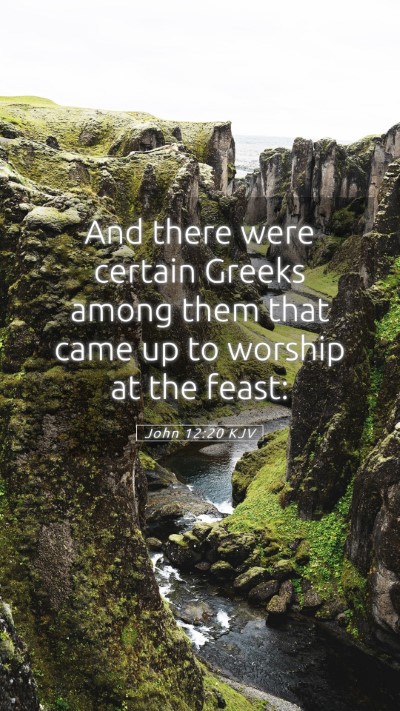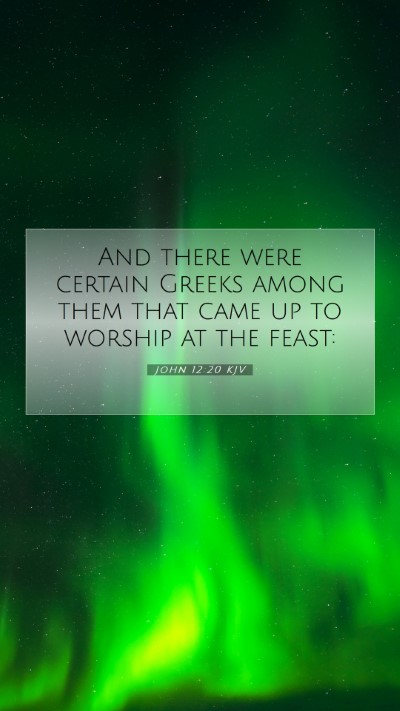Understanding John 12:20 - A Comprehensive Bible Verse Commentary
In this section, we delve into John 12:20, exploring its meaning through the insightful commentaries of notable theologians like Matthew Henry, Albert Barnes, and Adam Clarke.
Verse Text: “Now there were certain Greeks among those who came up to worship at the feast.”
Contextual Background
Before we analyze this verse, it is crucial to understand its context. The setting is during the final week of Jesus' ministry before His crucifixion, during the Passover feast. This was a time when people from various regions, including Gentiles, came to Jerusalem to worship.
Insights from Matthew Henry
Matthew Henry emphasizes the significance of the Greeks in this narrative. He notes that their presence illustrates the widening acceptance of Jesus' message beyond the confines of Jewish exclusivity. This foreshadows the later spread of the Gospel among the Gentiles.
- Worship at the Feast: The Greeks' desire to worship highlights a universal hunger for spiritual truth.
- Symbol of Inclusion: Their attendance signifies that the salvation Jesus offers is for all, breaking down ethnic and cultural barriers.
Insights from Albert Barnes
Albert Barnes adds further depth by exploring the implications of these Greeks seeking Jesus. He posits that their desire to see Jesus indicates a recognition of His authority and divinity, which is striking for individuals outside the Jewish faith.
- Curiosity and Respect: These Gentiles were likely attracted to Jesus due to His miracles and teachings, yearning for enlightenment.
- Foreshadowing the Great Commission: Their inquiry about Jesus prefigures the mission of the early church to reach all nations.
Insights from Adam Clarke
Adam Clarke provides additional insights by focusing on the historical context of the Greeks’ visit. He mentions that during the Passover, Jerusalem was filled with worshippers and that these Greeks might have been proselytes, indicating their serious commitment to the Jewish faith.
- Cultural Exchange: Their visit represents a moment of cultural exchange, signaling that God's promise was not limited to one ethnicity.
- Passover Significance: The timing of their visit shows their desire to connect with the roots of faith, enhancing their understanding of the coming Messiah.
Theological Significance
This verse has profound implications in terms of Bible verse interpretations and Biblical exegesis. It reveals:
- The inclusivity of Christ's message and the beginnings of a universal Gospel.
- The transition from an exclusive covenant with Israel to a message that encompasses all humanity, foreshadowing the Great Commission in Matthew 28:19.
- The acknowledgment of Jesus’ divinity and authority by seekers outside the Jewish tradition.
Application to Daily Life
For modern believers, this verse serves as a reminder of the importance of sharing the Gospel with all people regardless of their background. In our Bible study groups and online Bible study sessions, we should encourage an environment that welcomes all seekers of truth.
Related Scripture References
Here are some scripture references that resonate with John 12:20:
- Matthew 28:19-20: The Great Commission to spread the Gospel to all nations.
- Acts 10:34-35: Peter’s realization that God shows no partiality.
- Romans 1:16: The Gospel is the power of God for salvation to everyone who believes, to the Jew first and also to the Greek.
Conclusion
In summary, John 12:20 serves as a profound reminder of the universal reach of Jesus' message. By understanding this verse, we engage in deep Bible study insights and theological reflection. Explore more about the meaning of Bible verses and their applications in our lives by utilizing your favorite Bible study tools and resources.


